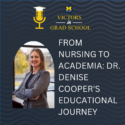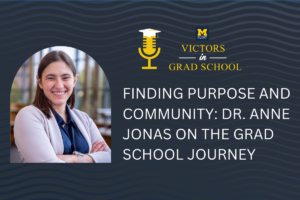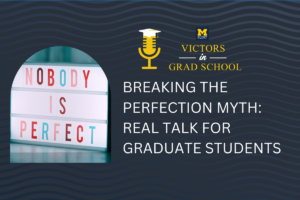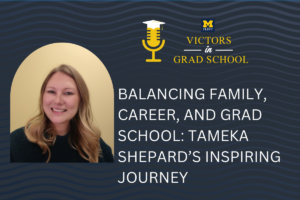Navigating graduate school while balancing life, work, and personal aspirations is no easy feat. Yet for Dr. Denise Cooper, Program Director for the Doctorate of Nursing Practitioner (DNP) program at the University of Michigan Flint, it’s a path laden with challenges, rewards, and invaluable lessons. In this week’s Victors in Grad School, Dr. Cooper shared her journey and provided insights for those considering or currently navigating the rigors of graduate education.
From Undergraduate to Advanced Practice Nursing
Dr. Cooper’s journey began as an undergraduate at the University of Michigan Flint, where she initially set her sights on becoming a nurse anesthetist. Despite her passion and preparation, shadowing professionals in the field revealed that her aspirations didn’t align with the realities of the role. She realized she yearned for deeper patient interactions, a value she felt would be better fulfilled by becoming a nurse practitioner.
“After shadowing, I’m so glad I did that because I decided that that definitely was not what I wanted to do,” Cooper shared. This pivotal moment highlighted the importance of real-world experiences in solidifying career decisions.
The Leap to Doctoral Education
After obtaining her Master’s degree in Nursing, Dr. Cooper could have easily settled into her role as a practicing Nurse Practitioner. However, her commitment to education and teaching led her to pursue a terminal degree.
“The longer I was a nurse practitioner practicing, and I was also teaching, I started talking to some of the other faculty, and then the former director at the time encouraged me to go back,” explained Cooper. Her decision was fueled by a desire to grow both as an educator and a practitioner, and to enhance her capacity to contribute to her field.
Balancing Act: Life, Work, and Education
Dr. Cooper’s educational journey was marked by significant life events. “Like many nurses, I was a mother, married, had family that I was tending to, trying to be the career nurse, also career as a student, managing the family,” she noted. Notably, she had all her children while in grad school, a tremendous challenge she does not recommend frivolously. The key to her success? “Perseverance and the willingness to pivot when needed.”
Her journey emphasizes that determination and adaptability are crucial to overcoming the myriad of obstacles that graduate students often face.
Preparing for a Role in Academia and Administration
Transitioning into a full-time faculty role and eventually into administration, Dr. Cooper distills her growth into one word: exposure. Engaging with diverse colleagues, participating in committees, teaching varying courses, and attending conferences broadened her perspective and honed her problem-solving skills.
“Nursing is a lot of problem solving…there’s a lot of problem solving that goes on,” Dr. Cooper reflected. Embracing the philosophy that “everything is figureoutable” has been instrumental in her professional and personal growth.
Offering Advice to Aspiring Graduate Students
To those embarking on a similar journey, Dr. Cooper advises a commitment to the process. “You have to really want it … be committed to gaining this degree and being a professional… there will be sacrifices to your family, and you have to go in understanding that.” This commitment, combined with the understanding that faculty are dedicated to their success, forms the bedrock of a graduate student’s journey.
Dr. Denise Cooper’s story is one of resilience, adaptability, and unwavering commitment. It serves as a testament and guide for current and prospective graduate students who aspire to navigate their own challenging yet rewarding paths in higher education. With the right mindset and support system, success in graduate school—and beyond—is within reach.
TRANSCRIPT
Dr. Christopher Lewis [00:00:01]:
Welcome to the Victors in Grad School, where we have conversations with students, alumni, and experts about what it takes to find success in graduate school.
Dr. Christopher Lewis [00:00:11]:
Welcome back to the Victors in Grad School. I’m your host, doctor Christopher Lewis, director of graduate programs at the University of Michigan, Flint. Really excited to have you back again this week. This week, as always, we are on a journey together. Whether you are at the very beginning just starting to think about, do I want to go back to school? Do I wanna continue my education? Or maybe you’ve already applied and got accepted. Or or maybe you’re in graduate school, and you’re watching for that light at the end of the tunnel getting ready to graduate and head off into your new career area. No matter where you are, you are on a journey. And this show is here to be able to help you, to provide you with opportunities to learn, to grow, to gain some tools for your toolbox, and allow for you to be able to gain some perspective about things that you can do to find success sooner.
Dr. Christopher Lewis [00:01:02]:
That’s why every week I bring you different guests, different people with different experiences that are able to share their own journey and what they learned in that journey to be able to help you on the journey that you’re gonna be going on. Today, we got another great guest. Doctor Denise Cooper is with us today. And Denise is the program director for our doctorate of nursing practitioner program, the DNP program at the University of Michigan Flint. She did her undergraduate work here at the University of Michigan Flint and then went on to get both a master’s and doctorate degree from the University of Michigan. Really excited to have her here for her to share her journey. Denise, thanks so much for being here today.
Dr. Denise Cooper [00:01:42]:
Thank you.
Dr. Christopher Lewis [00:01:43]:
Really excited to have you here today and to talk to you further about your own journey. And for one of the things that I love to do at the very beginning is turn the clock back in time. So I would love to be able to go back. And I know, like I said, you did your undergraduate work at the University of Michigan, Flint. And at some point during that journey, during your early career, you you made a choice. You made a choice that you wanted to go back, continue your education, and get a further degree. Bring me back to that point. And what made you decide to move on to get that master’s degree?
Dr. Denise Cooper [00:02:22]:
Well, I have to say that I kinda knew all along. So I didn’t know all along that I wanted to be a nurse, but when I decided I wanted to be a nurse, I also decided that I wanted to be a nurse anesthetist. So my plan was to get my nursing degree and to work in a critical care area and to apply to anesthesia school at the University of Michigan Flint. After I became a nurse, I worked in the ICU, CCU area, which I absolutely loved. And while I was doing that, I decided that I was going to shadow some c r n a’s that were at the hospital that I was working at. So I did end up shadowing 2 of them. And after shadowing, I’m so glad I did that because I decided that that definitely was not what I wanted to do, so that was quite a surprise to me. However, I did know that I wanted to advance my education, and so I determined that nurse practitioner would be the best option for me.
Dr. Denise Cooper [00:03:16]:
I really like the interaction with patients, And for me, that was really important, and I didn’t think I was going to get that level of interaction as a CRNA, and but I knew I would get that as a nurse practitioner. I love helping people, and I just knew that I could help people at a higher level. And so that’s what really brought me to University of Michigan in Ann Arbor to pursue my nurse practitioner master’s degree.
Dr. Christopher Lewis [00:03:41]:
Now you went on from there though, and you decided you got that that nurse practitioner degree. You could have stopped there. You could have said, I’m done. I’m just gonna go use this NP degree and go and practice and help people in different ways. But you made the choice to continue on and to get the DNP, the doctorate of nurse practitioner degree, the terminal degree for a nurse outside of the PhD in nursing. So talk to me about that, and what made you decide to push beyond the MSN?
Dr. Denise Cooper [00:04:10]:
So I didn’t think I was gonna get my doctorate. I thought I was gonna stop at my masters. But the longer I was a nurse practitioner practicing, and I was also teaching, I started teaching at the University of Michigan Flint School of Nursing, and I started teaching in the undergraduate program. The more and more I was teaching in the undergraduate program, I moved into the graduate program as an just an adjunct faculty, and I was working as a nurse practitioner. I’m like, okay. I really like this. And I started talking to some of the other faculty, and then the former director at the time encouraged me to go back. And, so the more I researched the different terminal degrees, a PhD versus a DNP, I decided that a a practice degree was the area that I really wanted to pursue.
Dr. Denise Cooper [00:04:51]:
And it that it was I knew it was a terminal degree. I knew it was the right thing to do, and I knew that if if I wanted to work as a faculty member that I really needed to pursue completing my education, if you will, with that terminal degree. So I ended up going back to Ann Arbor and doing the MSN to DNP.
Dr. Christopher Lewis [00:05:08]:
Now with every degree that a student goes through, there are transitions. So you had a transition from being a undergraduate student at the University of Michigan Flint, you transitioned into work, you transitioned from work, you back into the MSN, you you worked for a bit as an NP, You so you transitioned back into work, and then you transitioned back again and got that terminal degree. And you may have been doing some work while you were doing school too as as a part of that as well. So talk to me about well, as you think about all of those transitions, especially the transitions into different types of educational models, different schools, different programs, different expectations, what did you have to do as you transitioned into those different educational models and to find success? And what did you have to do to maintain that success throughout the entire educational journey at each level?
Dr. Denise Cooper [00:06:04]:
There was a lot to maintaining it. So like many nurses, I was a mother, married, had family that I was tending to, trying to be the career nurse, also career as a student, managing the family, and just trying to make those decisions about what was the right thing to do. I will tell you that I had all of my children while I was in grad school, which, by the way, I don’t recommend that to anyone, while I was getting my master’s degree. So I’ve learned a lot along the way about what to do and what not to do. I made it work. It took me a little longer to get that master’s, and I’m glad that I stuck with it and that I I stretched it out, but, you know, I kinda had to pivot. I had to to do things differently than I had planned, but it all worked out.
Dr. Christopher Lewis [00:06:48]:
I appreciate you sharing that because it’s it’s definitely not always easy. And there’s a lot there’s bumps in the road. There’s things that you have to overcome. And it’s not always going to be smooth sailing. There are definitely going to be challenges. And sometimes the challenges are easy to overcome. Sometimes they are more much more difficult to overcome. But the perseverance piece is so important to be able to keep pushing through and to find those supports along the way.
Dr. Christopher Lewis [00:07:14]:
Now I know that you have transitioned into being a full time faculty member, a administrator now in the program, the graduate program at the University of Michigan, Flint. And I guess as you think back now to all of the different education that you had that led you to where you are today, and you think back to the the things that you learned and the programs that you went through, what are some of the things that you feel prepared you best for the work that you do on a daily basis?
Dr. Denise Cooper [00:07:46]:
Well, you know, time is one thing. The the longer you hear, the more you learn, the more you involve yourself with. Right? Being on committees, involvement with the community, teaching different classes at different levels, encountering lots of different students. We have a really diverse faculty here, so just learning from all of them. I think each of those things helped me grow. So and and just exposing myself to people outside of the university, attending conferences and presenting at conferences, partnering with faculty at other universities for publications and research studies. Just all of those things really just helped me grow into the position that I’m in now. I wouldn’t say I ever saw myself in management position.
Dr. Denise Cooper [00:08:30]:
I just always saw myself in a nurse or nurse practitioner position where I was helping people, but what I have found is I actually I help lots of people in this position too. Nursing is a lot of problem solving, and this position, whether it’s faculty teaching a course or whether it’s a director, there’s a lot of problem solving that goes on. So I think my experience, many years of experience, has positioned me well to be able to problem solve and figure things out. One of my colleagues has a plaque on her desk that I absolutely love, and it says everything is figureoutable. And that’s my motto, is everything is figureoutable.
Dr. Christopher Lewis [00:09:08]:
Now I know that you work with a lot of graduate students of that you’ve worked with a lot of graduate students over the years, and you have had your own experience that has helped you to not only teach, but also to mentor and to help students along the way. As you think about students that you’re seeing in your program right now, what are some of the biggest challenges that you see those graduate students running into? And what type of advice might you offer to them that would help them to be able to overcome those issues?
Dr. Denise Cooper [00:09:39]:
I would say grad students run into a variety of of issues, but I would say probably the biggest thing is that we’re post licensure. Right? So we have nurses, and nurses are most of them are working, and a lot of them have families. And so unlike some other grad programs where students don’t work, In our program, the students are working, and I would say that that way, the biggest thing that they encounter is time, a lack thereof. Grad school is heavy. It’s not easy. It’s doable, but it’s not easy. And it does take a big time commitment, and there’s a lot of sacrifices. I I always tell my students that there’s you will make sacrifices.
Dr. Denise Cooper [00:10:24]:
There will be sacrifices to your family, and you have to go in understanding that and, you know, being committed to that. Students work a lot. They manage, lots of things within their families. Sometimes they carry the health insurance. And so we’re very aware of a lot of the issues that our students encounter. And we do the best we can to have the curriculum designed to be able to help them through that, but they have to be committed and remain resilient and committed to the process.
Dr. Christopher Lewis [00:10:52]:
Well, Denise, I just want to say thank you. Thank you for sharing your journey today, for the advice that you’ve offered to students. This has been great. And, you know, as you think about success and students, whether they are in your program, whether they’re in another they’re going toward another graduate degree, are there any other pieces of advice you’d want to give to all graduate students?
Dr. Denise Cooper [00:11:14]:
I would say that, I guess, kind of I’m gonna go back to the commitment piece. You have to really want it. I want my students in my class, they have to want it more than I want it. So I want to make sure that they know that they’re in the right place and that they’re committed to gaining this degree and being a professional as a nurse practitioner or whatever graduate degree they’re getting, physical therapist, physician’s assistant, whatever it is, that that’s their vision and that they’re committed to that vision and also that they know that as faculty that we’ve all been there and we’re committed to their success. We actually really care. We’re not just here for a job. This isn’t just a job to us. We are committed to their success.
Dr. Denise Cooper [00:11:59]:
Their success is our success.
Dr. Christopher Lewis [00:12:01]:
Well, as mentioned, Denise, I just wanna say thank you. Thank you for sharing your journey today and for the work that you are doing with your students to be able to help them to be successful in the programs that they’re in, and I truly wish you all the best.
Dr. Denise Cooper [00:12:13]:
Thank you. Appreciate it.
Dr. Christopher Lewis [00:12:15]:
The University of Michigan Flint has a full array of masters and doctorate programs if you are interested in continuing your education. Whether you’re looking for in person or online learning options, the University of Michigan Flint programs that will meet your needs. For more information on any of our graduate programs, visit umflint.edu/graduateprograms to find out more. Thanks again for spending time with me as you prepare to be a victor in grad school. I look forward to speaking with you again soon as we embark together on your graduate school journey. If you have any questions or want to reach out, email me at flintgradoffice@umflint.edu.





